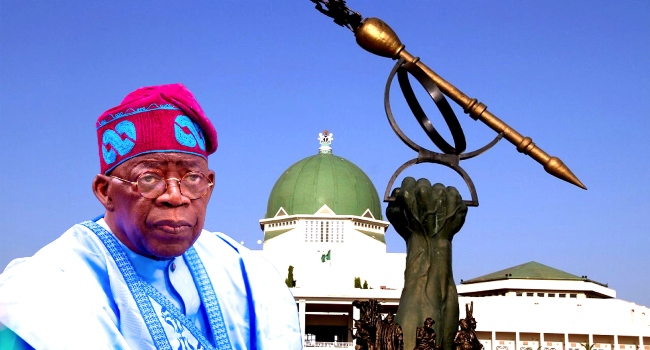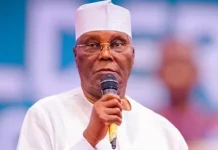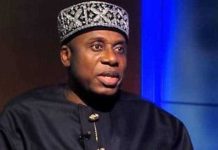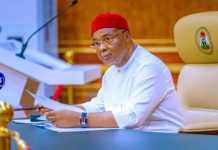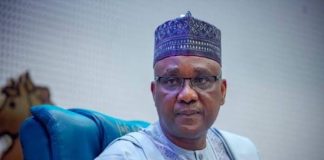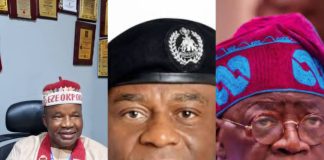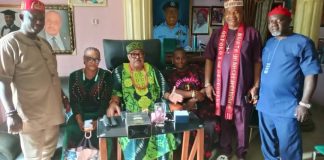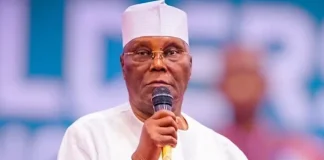🌿 Ruzu Non-Alcoholic Herbal Bitters
Ruzu Non-Alcoholic Herbal Bitters is a natural health supplement specially formulated to:
- ✅ Promote general wellness
- ✅ Detoxify the body
- ✅ Support the treatment of various ailments
Made from a powerful blend of 100% organic and medicinal herbs, Ruzu is completely alcohol-free, making it ideal for:
- 👪 All age groups
- 🌱 Health-conscious individuals
- 🌿 Anyone seeking non-alcoholic herbal remedies
Whether you're looking to boost your vitality, cleanse your system, or support healing the natural way, Ruzu Bitters offers a trusted herbal solution.
President Bola Tinubu has received a lot of praise from the National Assembly on June 12, which is Democracy Day.
During a joint session of the Senate and the House of Representatives on Thursday, Senate President Godswill Akpabio welcomed Tinubu and commended him as one of the architects of Nigeria’s democracy.
“As you fulfill the serious constitutional duty of addressing the people, the National Assembly is honored to have you as our President, our compatriot, and one of our own. In addition to honoring you as President, this chamber recognizes you as a key creator of the very democratic framework that we celebrate today.
We’re here today to celebrate resiliency rather than lament injustice. The Nigerian people’s unwavering faith in democracy, which has withstood deception, weathered tear gas, resisted armored tanks, endured quiet, and yet opted for voting over using a gun, is what we witness, not the victory of politicians, Akpabio stated.
Looking back, Akpabio praised Nigerians for their tenacity in defending democracy in the face of violence.
The candle of the protracted struggle for liberation was kindled on June 12, 1993. Nigerians took a stand and declared, “Our voice matters.” Our vote matters.
But on June 12, 1993, a brief statement announcing the annulment of the Nigerian people’s freely expressed choice in the historic June 12 Presidential Election put out the fire, according to Akpabio.
Hope, anger, and tears spilled into the streets. Nigeria lost her innocence in addition to losing an election. And the roar of resistance shattered the shock-induced hush throughout the nation. People got up. Students marched in anger.
“Nigeria on the march again” was the opening line of Chief Moshood Abiola’s campaign song, which perfectly encapsulated the mood of the day. Nigeria was, in fact, moving closer to democracy. But the march for democracy became a march for justice after that callous announcement,” he continued.
He added that “while others chose silence or compromise,” the President “chose courage,” pointing out that many, including Tinubu, stood tall during those terrible days.
“NADECO, of which you were a part, helped keep the flame of liberty burning when it was most in danger of going out at great personal cost,” he added. Let’s commemorate those who suffered so that we might cast our ballots on this day. Those who risked their lives so we may talk. those who were laid to rest in order for freedom to triumph. Let’s also honor everyone who was instrumental in Nigeria’s democratic transition.
Read Also: PDP Warns Against One-Party State, Calls on Nigerians to Resist Tinubu, APC on June 12
“’26 Years of Democracy: Renewing Our Commitment to National Development,’ this year’s theme, is not a catchphrase. It is a summons to action. A reminder that democracy is a tool for transforming a country, not its goal.
According to the Senate President, Tinubu’s administration has brought about previously unheard-of developments in Nigeria.
“We have witnessed a change under President Tinubu’s direction in his audacious approach to challenging reforms. The Nigerian Education Loan Fund, the unification of the foreign exchange market, the creation of regional development commissions, the elimination of fuel subsidies, the attraction of foreign investment, and tax reforms are just a few examples of the difficult choices this administration has not shied away from making in order to stabilize and expand our economy,” he said.
In Two Years, 844 Bills Were Introduced
Ahead of the NASS’s second anniversary on June 13, Akpabio also enumerated some of its accomplishments.
“This dedication is demonstrated by its remarkable output: 844 bills have been introduced in its first two years, an unprecedented number that highlights the Senate’s proactive approach to addressing urgent national issues,” he said.
“Out of this outstanding volume, 409 bills have advanced to second reading, 206 bills are awaiting first reading, reflecting a robust pipeline of legislative ideas prepared for formal introduction, and 107 bills are currently at the committee stage, undergoing the necessary scrutiny and stakeholder engagement that ensures quality legislation.”
“A record for any Nigerian Senate at this stage of the legislative cycle,” he said, the Senate has passed 96 measures.
More importantly, the President has signed 52 of these legislation into law, making them enforceable regulations that will influence national security, public welfare, economic growth, and governance.
“These bills include tax reforms, regional development commissions, universities and tertiary institutions, agricultural institutions, the National Education Fund, and the local government autonomy bill, among others.”
Additionally, the 10th Senate has taken decisive action on 26 Executive Bills, demonstrating a sound balance between supervision and collaboration in its interactions with the executive branch. These executive-sponsored laws cover important policy topics and gain from the Senate’s careful examination and improvement prior to ratification.
We received 80 petitions.
Akpabio added that 18 of the 80 petitions submitted by people and civil society groups to the 10th Senate had been fully adopted.
In addition to bills, 80 petitions from citizens and civil society organizations have been submitted to the 10th Senate. This demonstrates the public’s faith in the organization. Eighteen of these petitions, which offer institutional accountability, transparency, and restitution, have been fully adopted.
History shows us that when the Executive leads with vision and the Legislature leads with wisdom, countries advance the most. However, they thrive best when they work together as co-stewards of the national trust rather than as adversaries,” he stated.
As a result, he asked Nigerians to uphold the lessons learned on June 12.

